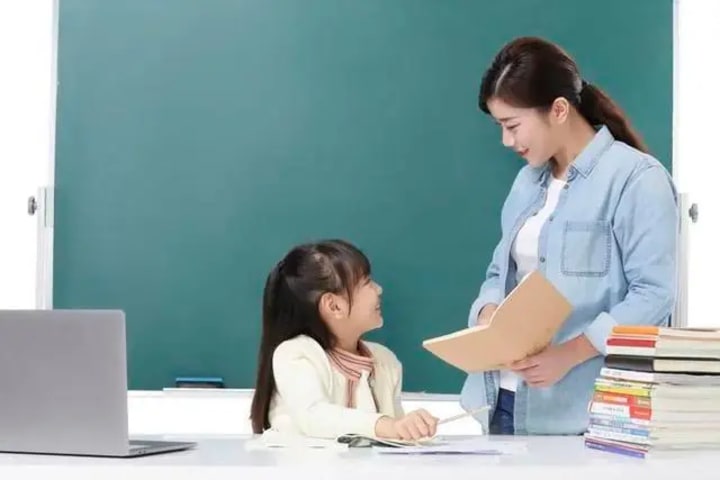
How to adapt to the new environment in the first month of school? Experienced teachers will give you tips
It's the beginning of the school year, and another group of "beanbags" are going to school. The first month of school is very important, and children always have to adapt to a new environment. So, how can parents effectively accompany their children through this critical phase? How to better cultivate good living and learning habits for children?
Here's what parents can do when their children start school
With the arrival of the school season, children who have just started school often go through a process where they are full of energy during the first day or two of school, and then they are down in the dumps within a few days. So, how should we help our children smoothly through the school adjustment period?
First, children express more, parents accompany mother re. After entering elementary school, children's classmates and teachers around them have changed, and they will experience interpersonal discomfort. Parents can help their children fall in love with school by guiding them to share more interesting stories at school after school each day. In peer interaction, parents should encourage their children to try to solve problems among their peers on their own. When the child encounters problems with peer interaction, parents should first check with the teacher, guide the child to tell the teacher about his unpleasantness in the first place, nd ask about the child's needs so that we can help the child solve the problem in time.
Second, the child is more hands-on, and rents will let go. Based on years of teaching experience, we find that children with stronger hands-on skills adapt faster and have stronger learning and self-management skills. Self-care is a basic hands-on skill that parents need to help their children develop, such as letting them organize their school bags, and school supplies, sitting at desks, dressing and undressing independently, and putting on and tying their shoes at home. In particular, children should be encouraged to develop the habit of carrying their school bags. Parents can take their children to play with puzzles, jigsaw puzzles, and assembly toys, and give them more space to think and try independently.
Third, children read more, parents plan smart. "Double reduction" background, many parents are worried about "zero-based" scschoolsill not letting children lose at the starting line. InThisoncern is not necessary, more important than the knowledge itself is the interest and ability to read. "A person who loves to read and can read will be unique in his or her cultural heritage, expression and understanding, as well as in the way he or she conducts himself or herself. First graders can read more picture books, and simple words with beautiful pictures, which help develop children's imagination. In addition to fairy tales, safety education, and science knowledge, math picture books are also essential. In the process of reading development, parents should guide their children to plan well, lead them to make a simple reading schedule, and specify the reading time and reading schedule. A child's growth is a long process. Starting from the first month of school, grasping these things will not only help your child adapt to first grade smoothly, but ut also help your child grow more independently and happily in the next six years of elementary school life!
Parents need to be good partners for their children in the transition between elementary and junior high school

As first graders enter ementary school from kindergarten, how parents should guide their children at home to adapt to elementary school life, develop good learning and living habits, and do a good job of bridging elementary school is the most important topic for parents. Change your role as a parent, good parents start by being a good partner to their child. Planning time, and reasonable arrangements. When students enter elementary school, they have a fixed work and rest schedule, so before they start school and just at the beginning of school, parents should pay attention to begin to cultivate the good habit of going to bed early and getting up early, and pay attention to the time and number of times students go to the bathroom. Try to make sure that you don't go to the bathroom in class, and be prepared for breaks between classes. Pay attention to emotions and positive guidance. When students enter elementary school, the class size increases compared to kindergarten, and more often than not, students autonomously interact with each other, so when students go home, parents should pay attention to their students' emotional changes and provide timely guidance. For example, you can ask your child, "Did anything make you happy today?" Guide your child to find more happiness at school and create happiness. If your child is depressed, pay attention to the way you communicate, not just empathize, but guide your child to learn to face problems, solve them, and resolve negative emotions. Home and school communication to understand the situation. As parents, we should pay special attention to communication with teachers. Some students like to come home and "report the good news but not the bad", while others only "complain" about their "grievances" at school. Therefore, parents need to have a thorough understanding of their child's school life. Communicating with teachers at the right time is the best way to understand what is going on at school and to better guide your child. In the process of communication with the teacher, to understand the child's performance at school, but also to communicate with the child at home, and free teacher to understand certain guidance, and old training methods, to achieve a close contact between home and school, Soto el children adapt to elementary school life faster, to develop good habits. Learn to "show weakness", and apappropriatelylet go". After entering elementary school, students should be able to take care of themselves, so parents should be willing to "let go" and let their children do things independently that they can do. For example, putting on clothes and shoes by themselves, and organizing school bags. Under certain circumstances, you can show your child "weakness" and encourage him or her to take the initiative to undertake certain chores, so that he or she can exercise his or her self-care ability and acquire certain life skills that can be applied in school and at home. As parents of new elementary school students, they should always pay attention to their children's growth and accompany them in their growth. They should gradually develop their children's skills and agree from the bottom of their hearts that they can do it, and dare to let go of their children to let them exercise. In this way, the child can brbridgearly childhood learning and life, and gradually become a real elementary school student.
Helping your child adapt to the full range of science to help the transition between kindergarten and elementary school
The first-gradebeanbags" have started school, but the transition continues. What exactly is the "connection" between kindergarten and elementary school? What preparations should be made? The Guidance Points for Adaptive Education in Primary School focuses on the goal of "promoting children's overall physical and mental adaptation" and proposes four aspects of physical and mental adaptation, life adaptation, social adaptation, and learning adaptation.
Physical and mental preparation - understanding elementary school and gaining positive emotional experiences. Physical and mental readiness means that children are prepared mentally and physically in terms of motor development. Parents need to help their children establish positive expectations for school. Talk a lot about elementary school and talk to your child about confusion and concerns about starting elementary school and help resolve them. Say encouraging words so that your child is motivated by positive emotions. Develop your child's ability to express and regulate his or her emotions by using more picture books and conversations. Participate in more sports and exercise your child's fine motor skills through activities such as drawing, cutting, folding, tearing, gluing, and putting together. Life preparation - Exercise self-care and develop good living habits.

Preparation for life means preparing accordingly in terms of daily living skills. Reduce the amount of time your child spends using electronic devices and ensure 10 hours of sleep each day. Provide dedicated storage space for personal belongings at home and guide your child to sort and organize supplies to improve self-service skills. Assign small tasks for work at home and encourage your child to complete them. Also, guide your child to respect the workers around them and cherish the fruits of their labor. Enhance children's awareness and ability to protect themselves by watching picture books and videos.
Learning readiness - stimulate interest and improve comprehensive learning skills. Learning readiness means preparing accordingly in terms of learning interest development and learning habits. We need to guard our children's curiosity, accept and encourage them to observe, think and explore new things, and respond promptly to support our children to continuously and deeply search for answers to their questions. Life allows children to develop listening and speaking, reading and feedback, comprehension, and practice skills in authentic contexts. At the beginning of the school year, children can participate in the whole process of preparing learning and living utensils, listen to their opinions, and develop the intuitive feeling that "elementary school learning is very different" and "I am responsible for my learning", sotoevelop children's learning ability.
Social readiness - social adaptation and a sense of self-discipline and rules. Social preparation means preparing your child for the group life that is characteristic of elementary school. For example, take your child out more often or participate in community activities to support them in acquiring methods and learning to socialize. Consciously assign your child small self-discipline tasks, such as folding their owilts and organizing toys and objects, so that they can experience a sense of accomplishment. In addition, talk to your child more about the class and initially develop a sense of collective belonging. Inspire their beautiful feelings of loving their hometown and motherland by visiting museums and science museums together.
Seize the adjustment period and cultivate good habits
The moment children walk into school with their backpacks on their backs, it means they have entered a school life that focuses on learning. Seizing the adjustment period of first-grade school and cultivating good habits will affect children's future school learning and life.
First, cultivate good living habits. First, parents should adjust their children's biological clock. Wake up your child according to the rest time of elementary school, if often "late" will affect not only the child's learning, but also affect the child's psychology. Secondly, it is important to develop self-care skills. Organize your room and your desk for studying. In the first and second grad grades, your grandest have a good habit of organizing yourtheirk, which will seriously affect your child's concentration and completion speed. Finally, before going to bed each day, prepare the stationery, pack the school bag according to the class schedule, and fold the clothes to be worn the next day and put them, aside.
Second, develop good study habits. The best time to develop good study habits is for children who have just started school and will unconditionally follow the instructions of their teachers and parents. First of all, learn to listen, and listen carefully in class. When others have finished speaking, if they have their powers or opinions, they can raise their hands for the opportunity to speak. Secondly, you should be willing to ask questions, and when you encounter something you don't understand or something new and curious, you should ask your teacher or classmates for advice in time. When you ask a question, you should clearly express your inner question and try to complete the language. After school, parents can also ask, "What questions did the teacher ask today? How many times did you raise your hand? Finally, it is important to develop the habit of writing carefully. Good writing posture is not only the basis for good handwriting, but it can also have an important impact on ststudent'shysical development.
Third, cultivate good habits of interaction. First graders tend to live in their own "kingdom" and do not know how to think differently, their relationships with peers are simple and unstable, and "conflicts" often occur between classmates. Parents should change their mindset, on the one hand, teach their children to learn tolerance, politeness, discipline, respect for teachers, and other methods of interaction, and introduce the benefits of school to their children so that they can experience the joy of being with children; on the other hand, to establish a harmonious, stable and trusting relationship between home and school, often communicate effectively with the homeroom teacher to understand their children's learning and daily performance at school, and accelerate their adaptation to school life. The early years of school are both an adjustment period and a time of adjustment. We believe that parents and children, under the guidance of teachers, will be able to develop good habits and lay a solid foundation for their future learning life.
About the Creator
Ufreleyi
Easy come, easy go.






Comments
There are no comments for this story
Be the first to respond and start the conversation.